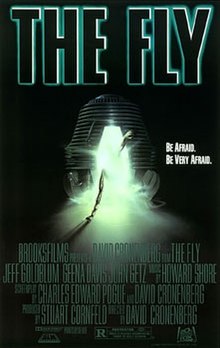The Fly (1986 film)
| The Fly | |
|---|---|

Theatrical release poster
|
|
| Directed by | David Cronenberg |
| Produced by | Stuart Cornfeld |
| Screenplay by |
|
| Based on |
The Fly by George Langelaan |
| Starring | |
| Music by | Howard Shore |
| Cinematography | Mark Irwin |
| Edited by | Ronald Sanders |
|
Production
company |
|
| Distributed by | 20th Century Fox |
|
Release date
|
|
|
Running time
|
96 minutes |
| Country | United States |
| Language | English |
| Budget | $9–15 million |
| Box office | $60.6 million |
The Fly is a 1986 American science fiction horror film directed and co-written by David Cronenberg. Produced by Brooksfilms and distributed by 20th Century Fox, the film stars Jeff Goldblum, Geena Davis and John Getz. Loosely based on George Langelaan's 1957 short story of the same name, the film tells of an eccentric scientist who, after one of his experiments goes wrong, slowly turns into a fly-hybrid creature. The score was composed by Howard Shore and the make-up effects were created by Chris Walas, along with makeup artist Stephan Dupuis.
The film was released on August 15, 1986 to massive acclaim by critics and audiences, with praise mainly regarding the special effects and Goldblum's performance. It grossed $60.6 million at the box office against its nine-million-dollar budget, becoming the largest commercial success of Cronenberg's career. Walas and Dupuis' work on the film resulted in their winning an Academy Award for Best Makeup, the only film directed by Cronenberg to win an Oscar. A sequel, directed by Walas himself, was released in 1989.
Seth Brundle, a brilliant but eccentric scientist, meets Veronica Quaife, a science journalist, at a press event. He takes her back to his warehouse home and laboratory and shows her his invention: a set of "telepods" that allows instantaneous teleportation from one pod to another. Brundle convinces Veronica to keep the invention secret in exchange for exclusive rights to the story, and she begins to document his work. Although the telepods can transport inanimate objects, they mutilate live tissue, as is demonstrated when a live baboon is turned inside-out during an experiment.
...
Wikipedia
